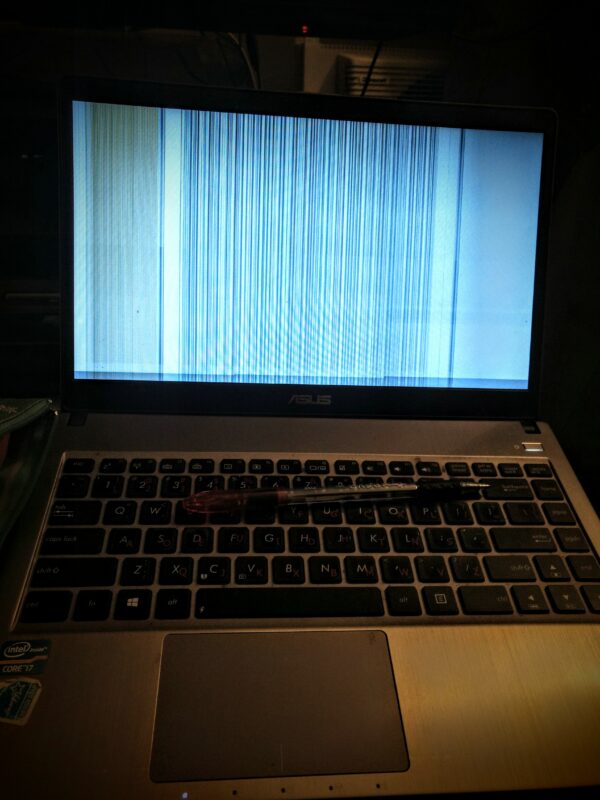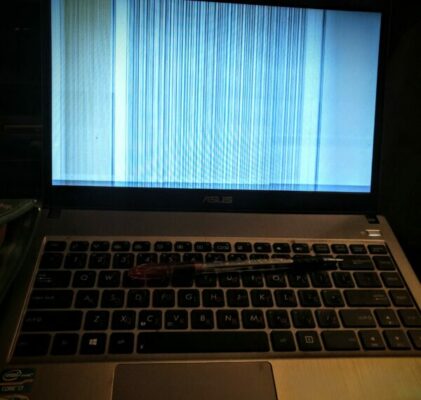I consider it one of my good qualities that I hang onto my electronics as long as possible. In part, this is because I want to do as little as possible to contribute to an industry that destroys the planet and uses questionable labor practices*. I buy refurbished most of the time. I repair things when I can. I tolerate screen issues that literally make other people gasp in horror and ask if my computer is going to be ok. (It’s not. Oh, it’s not, it’s not, but you are so sweet and innocent, we can pretend that a repair will be possible.)

Anyway, this is normally a good thing. But sometimes it lands me in a situation in which my two vital electronic tools go on the fritz at the same time.
My phone shuts off randomly, many times per day, while still at 90% power, sometimes dying in an endless loop of battery deaths. It’s kind of like this:
My laptop will act completely normal and then lines of static will burst across the screen and defibrillate my eyes. It’s kind of like this:
Anyway.
Everything breaking at once sucks.
It’s also a strategy.
Or rather, it’s part of a strategy.
I’m keeping my overhead low.
Times are always tough economically for artists and freelancers, so define the sort of lifestyle you want to live, budget for your expenses, and draw the line between what you will and won’t do for money.
And remember: If you want maximum artistic freedom, keep your overhead low. A free creative life is not about living within your means, it’s about living below your means.
“Do what you love!” cry the motivational speakers. But I think anybody who tells people to do what they love no matter what should also have to teach a money management course.
“Do what you love” + low overhead = a good life.
“Do what you love” + “I deserve nice things” = a time bomb.
Austin Kleon, Keep Going
Keep Going came out recently, but this is a strategy I’ve been living for a few years now. It’s intertwined with the fact that I work part-time in large part to make sure I’ll be able to do my writing. These two parts of my Master Plan are so inextricably linked that I had to cut an entire post’s worth of material about what it’s been like to give up the only full-time job I’ve had in my life.
The Alone in a Room With Invisible People podcast aired two episodes on perfectionism, in which they also discussed the concept of making financial trade-offs to gain more time to do what you really want with your life. In this case, writing.
It’s not that I have any more time than you. It’s that I spent my time specifically doing these things. I have made sacrifices in my life to sit down–and I have less money, less security– we have less security, we have more worries because of our sacrifices. In order to help me do what I want, like we did for him. And people don’t understand. They just think, “Oh, you’re lucky.” No.
Rebecca Galardo, the Alone in a Room with Invisible People podcast, Episode 56: Perfectionism–First Draft
In the podcast, Rebecca goes on to talk about having less stuff, and less nice stuff, than other people, and not being able to go out to bars or shopping with friends all the time because of her commitment to writing. We live in a time and place in which it’s possible to live on fairly little money, and end up with way too much stuff (Hi, Dollar Store!), but that’s besides the point.
The point is about making choices. Trade-offs.
In one of my earliest posts, Paper, Flip Phones, and Anvils, I wrote about not making other people justify the things they own:
If someone prefers physical books to ebooks, don’t make them justify it.
If someone doesn’t have a smartphone, don’t make them justify it.
If someone doesn’t have internet access at home, don’t make them justify it.
If someone doesn’t have GPS and, to all appearances doesn’t need it, don’t make them justify it.It doesn’t matter if they are poor, or old, or technologically illiterate, or made a choice that you don’t understand and don’t give a shit about. Don’t make them justify that they don’t own an item, just like you wouldn’t make them justify not owning designer jeans or not owning a home aquarium or not owning a BMW*.
Kris Bowser, Paper, Flip Phones, and Anvils SELF QUOTES ARE SO CLASSY
I wrote the above quote right around when I came up with my Master Plan. The idea of making trade-offs and not compromising on my dreams and goals was one and the same as my reasoning for not upgrading my phone, my car, and my laptop until I absolutely needed to.
I had a flip phone until December 2016, and I got a ton of shit for being a Luddite (even though I design websites!) because people didn’t understand the nature of the choice. I upgraded only when the smartphone choice became pragmatic as well as shiny, like a unicorn with a sensible rain coat.
We don’t have a microwave either. Same deal. That, too, was a choice.
One night at my old job, when I was training a fellow security guard, he brought in his new computer, an $1100 HP laptop. Awesome graphics card! Fast processor! Huge hard drive! Tons of RAM! Can make paninis and will sing you to sleep while gently stroking your eyelids with delicate little machine hands!
What did he do with this awe-inspiring machine?
He watched Youtube videos and typed Word documents, two things you can do on absolutely any computer.
In other words, he could’ve saved $900 if he’d taken a few minutes to think about what he’d actually use the laptop for. That’s all it comes down to: taking a little time to think.
Who are you? What do you do? Will the new shiny thing help who are you and what you do?
I’m Kris. I write. I go outdoors. I try to take care of my family, even though I’m only about three-quarters of a functional person.
Between the first draft and these final paragraphs, I upgraded my phone. It’s not as important to my writing process, but I don’t want to be left at the mercy of its treacherous battery if I’m out hiking and get some kind of injury.
I find myself examining my new phone’s case and screen protector over and over again to make sure they won’t betray me after I finally spent the money to upgrade.
And the laptop? The laptop is like the terminal cancer patient who is given one month to live, and lasts another ten years. Or, more literally, one year. I’ll replace it as soon as I can’t write on it because writing is what I do.
This is what it means to make trade-offs for for my work.
It’s not about asceticism; it’s about an honest accounting.
*To put it diplomatically, which I probably shouldn’t do.
